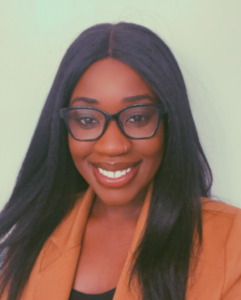In the aftermath of the 2020 murder of George Floyd by four white Minneapolis police officers, as Petra Owusu grappled with a flood of emotions, her thoughts turned to Black youth.
How were they dealing with the news of Floyd's death?
Her concern was grounded in her lived experience.
Early in her childhood, Owusu's younger brother died from a heart defect. Though her family mourned deeply, they never discussed her brother's death.

Petra Owusu
"It was just something you didn't talk about," she said. As a result, Owusu now sees she "navigated the world a bit differently."
"I didn't understand why I wasn't attuned to my emotions or why I resisted and felt guilty for having them."
It wasn't until she was pursuing her master's at Western that Owusu, now pursuing her PhD, came to comprehend her emotional avoidance as a symptom of trauma, and an outcome of the greater intergenerational trauma behind her family's response.
"Some of it is protective and part of a survival mode' because of what has happened in the past," Owusu said, noting how systemic racism has forced Black people to suppress or police their emotions and avoid seeking help from institutions that ignored their history, or, as in the Jim Crow era, caused harm.
After Floyd's death, "I could see as a community we were mourning, but we couldn't process it, because we've never learned how," she said. "We didn't know where to turn and how to articulate our feelings, because we've been so disconnected and disassociated for so long."
As an aspiring clinical child psychologist, Owusu recalls wondering, "If I, as someone in a higher education setting with access to this deeper knowledge was still struggling, how were Black youth navigating their emotions as they consumed all the media? Did they know how and where to seek help?"
Her questions became the foundation of her doctoral research, and ones she posed to Black youth directly, to discover and dismantle barriers to care, while promoting the benefits of mental health services.
Amplifying Black youth voices on mental health
Emerging research shows a widening racial disparity in mental health service use, particularly among Black youth. Black youth face more barriers at every stage of the help-seeking process compared to other racialized groups. The risk of death by suicide for Black youth is also on the rise.
Yet, there's a lack of qualitative research in Canada and little understanding of how Black youth view mental health across their development.
To address those gaps, Owusu designed a youth-centered community-based research project, engaging students in Grades 7, 8, 11 and 12 for their input.
"My research is unique because it is the first of its kind to ask Black Canadian youth for their thoughts on mental health and why they think there are barriers to accessing services," she said.
Partnering with two schools in Windsor, Ont., Owusu launched a three-month study, conducting focus groups, providing mental health workshops and leading knowledge mobilization activities.
Owusu's research was supervised by education professors Gabrielle Lee and Jacqueline Specht.
"Petra's work addresses the under-researched area of Black youth mental health in Canada and adds much to our understanding for clinical and school practice," said Specht, who also serves as the director of the Canadian Research Centre on Inclusive Education at Western.
'Heartbreaking' findings, hopeful and heartwarming' results
The lingering effects of intergenerational trauma came to light quickly in Owusu's focus groups.
Responses such as "we can't be sad" and "you're weak-minded if you ask for help" underscored the prevalence of silent suffering and how expressing emotions is stigmatized - particularly for Black males.
"Black boys feel the weight of the unattainable luxury' of showing their feelings or talking about them," Owusu said, "There's a lot of shame and that broke my heart."
The influence of the media, and its lack of cultural diversity, is also problematic.
"Black youth are relying on media to provide them with a template of what a person dealing with mental health or talking about it looks like. Those people tend to all be white, reinforcing the message that mental health is a white person thing.' When they experience similar symptoms, they see it more as having a weird problem,'" Owusu said.
She also found anti-Black racism was internalized.
"It's really heartbreaking to hear the challenges they're facing and the feeling of being different as young as kindergarten," Owusu said.
"There's a stigma around Black people being aggressive. Only angry you can't be sad." - Male, Grade 12
"When you are Black, you don't know how people are going to perceive you. It will make you anxious, because if you say the wrong thing, or do the wrong thing, people are watching. It creates more anxiety on what you say or do." - Female, Grade 12
'Mental health workshops spark lightbulb moments'
Owusu also discovered misguided beliefs about therapy, which she addressed in her workshops, along with common mental health disorders such as anxiety and depression.
Sharing mental health wellness tips and exercises provided many "lightbulb moments" for the students.
"It allowed them to see there is help available. Many said they found the workshops therapeutic,' and asked if they could start a mental health group," Owusu said.
They also felt empowered to share mental health tools with other Black youth through knowledge mobilization activities, which also included messages about how they'd like to be "seen" by educators, caregivers and clinicians.
"It's so crucial to observe a person, holistically, understanding the generations before them, how systems work against them and how that impacts them seeking care," Owusu said.
Watching the students' progress was a rewarding experience for Owusu, who hopes to continue to make inroads working with Black youth after she receives her doctorate in school and applied psychology in June.
"My heart is warm, knowing they're in a better place, but my heart breaks for the suffering they've had to go through," Owusu said.
"It was surprising how far they came in a three-month period. They were receptive and willing to talk, even though they came in with some strong perceptions. I applaud them for their bravery and for having difficult conversations."










